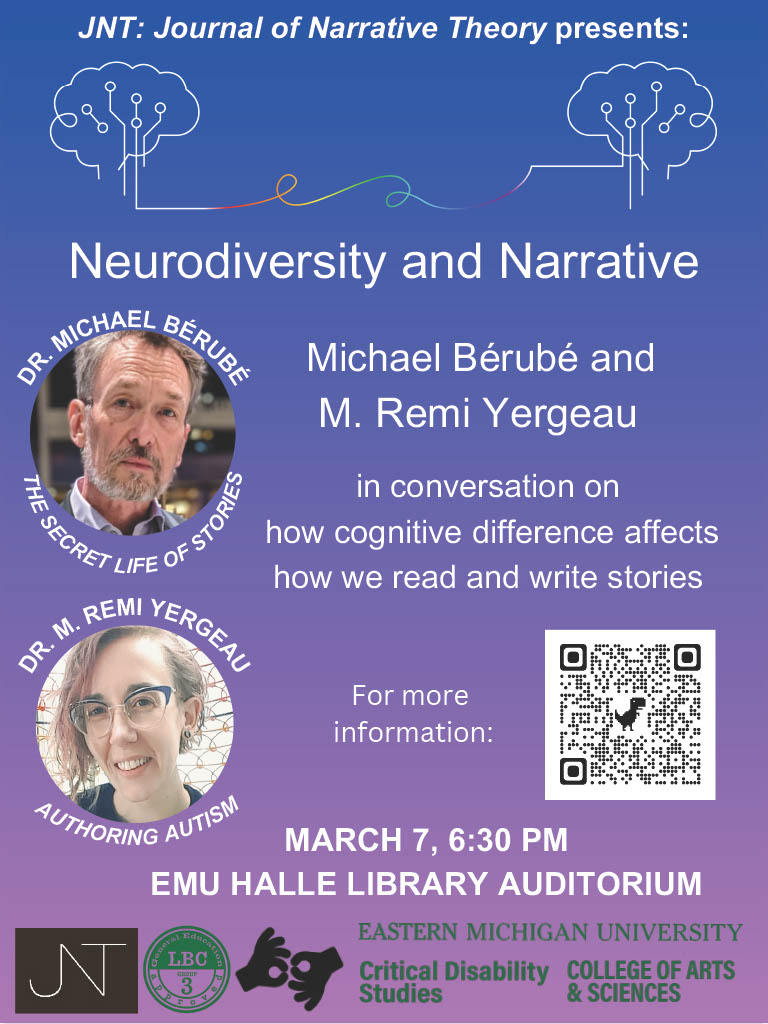JNT Dialogue: Speaker Series
The JNT Dialogue is JNT’s annual speaker series. Each year, the JNT Dialogue invites keynote speakers to present on topics at the forefront of discourse about narrative theory. Previous Dialogue topics include “Detroit as a Narrative Space,” “Environmental Futures,” and “‘Stand Whose Ground?’ Indigeneity, Migrancy and Sovereignty.”
2024 JNT Dialogue

Neurodiversity and Narrative
To watch the 2024 JNT Dialogue: Click here
Storytelling is, for many, one of the definitions of what it means to be human. In shaping how we come to understand ourselves and others, the capacity for narrative represents both sentience and sociality. Yet we live in a society that deems some people, because of their cognitive difference or intellectual disability, incapable of communicating symbolically or of understanding the narratives they inhabit, thereby essentially robbing them of their humanity. If our ideas of what it means to be human depend on our assumptions about cognitive dis/ability, then the exploration of cognitive difference in narrative and the study of how neurodiverse authors “story” themselves is an opportunity to discover rhetorical conditions that craft a more capacious sense of agency and humanity.
How does cognitive difference affect the way we read and write stories? JNT: Journal of Narrative Theory presents Dr. Michael Bérubé, author of The Secret Life of Stories: From Don Quixote to Harry Potter, How Understanding Intellectual Disability Transforms the Way We Read, and Dr. M. Remi Yergeau, author of Authoring Autism: On Rhetoric and Neurological Queerness, in conversation on narrative and neurodiversity.
Michael Bérubé is an Edwin Erle Sparks Professor of Literature at Pennsylvania State University. He is the author of twelve books to date, including Life As We Know It: A Father, A Family, and an Exceptional Child (Pantheon, 1996; paper, Vintage, 1998). Life as We Know It was a New York Times Notable Book of the Year for 1996 and was chosen as one of the best books of the year (on a list of seven) by Maureen Corrigan of National Public Radio.
In 2015 he published The Humanities, Higher Education, and Academic Freedom: Three Necessary Arguments, co-authored with Jennifer Ruth (Palgrave). His ninth book, The Secret Life of Stories: From Don Quixote to Harry Potter, How Understanding Intellectual Disability Transforms the Way We Read, was published by NYU Press in early 2016; in October 2016, Beacon Press published Life as Jamie Knows It: An Exceptional Child Grows Up, which was written with extensive input from Jamie himself. In 2021, the Norton Library (a new series from W. W. Norton) published his edition of Mary Shelley's Frankenstein (the 1818 text).
In 2022, Johns Hopkins University Press published his second collaboration with Jennifer Ruth, It's Not Free Speech: Race, Democracy, and the Future of Academic Freedom, a provocative book that asks whether academic freedom--as distinct from free speech--should extend to white supremacists, or whether we should treat advocates of racist pseudoscience the way we treat believers in phlogiston or the efficacy of human sacrifice.
In 2024, Columbia University Press will publish his most recent book, The Ex-Human: Science Fiction and the Fate of Our Species.
M. Remi Yergeau is Associate Professor of Rhetoric and Composition at the University of Michigan. They are the author of Authoring Autism: On Rhetoric and Neurological Queerness (Duke University Press, 2017) and the recipient of the 2017 MLA First Book Prize, the 2019 CCCC Lavender Rhetorics Book Award for Excellence in Queer Scholarship, and the 2019 Rhetoric Society of America Book Award. With articles like “Cassandra Isn’t Doing the Robot: On Asexuality and Contagious Autism” (Rhetoric Society Quarterly 50.3), “Cripping Neutrality: Student Resistance, Pedagogical Audiences, and Teachers' Accommodations” (Pedagogy 20.1) and “Disability Hactivism” (Computers and Composition Online 2014), Yergeau publishes on topics ranging from Rhetoric and Composition, Disability and Trauma, as well as Gender and Sexuality.
JNT is grateful to the cosponsors of this event:
EMU College of Arts and Sciences
EMU Critical Disability Studies
Details:
Date: Mar. 7th, 2024
Time: 6:30 - 8 pm.
Location: Halle Library Auditorium, G03 (Basement level)
ASL interpretation will be provided.
Parking information for guests:
We recommend that guests to campus use the Mid Campus/Bowen field pay parking lot. Alternately, you can also find parking at McKenney Lot and Student Center Lot. A limited number of parking passes will be available at the event for complimentary parking. Please feel free to contact [email protected] by Mar. 3rd to reserve one in advance.
Past Dialogues and Topics
- 2023: "Video Games and Narrative" with Dr. Aubrey Anable and Dr. Soraya Murray
- 2022: “Resonance and Ruin: Narrative, Race and Cognition" with Dr. Sue J. Kim and Dr. aliyyah abdur-rahman
- 2021: "Detroit as a Narrative Space" with Detroit-based authors Desiree Cooper and kim d. hunter. Watch the video here, or check out the Detroit 20/20 contest submissions here
- 2020: “Neglected Histories, New Odysseys, and the Cultural Work of Fantasy” with Saladin Ahmed and Ausma Zehanat Khan
- 2019: “'Stand Whose Ground?' Indigeneity, Migrancy, and Sovereignty" with Jodi A. Byrd and Shailja Patel
- 2018: “Environmental Futures” with Ursula Heise and Rob Nixon
- 2017: “Temporalities of Crisis and Condition” with Lisa Lowe and Mimi Thi Nguyen
- 2016: Homi K. Bhabha and Claudia Rankine (video below or here)
- 2015: “After Post-Structuralism?” with Nancy Armstrong and Jonathon Elmer
- 2014: “Thinking Bodies” with Laura Otis and Jay Clayton
- 2013: “The Queer Commons” with José Esteban Muñoz and Samuel Ray Delany, Jr. (video below or here)
- 2012: “Nonhumans: Ecology, Ethics, Objects” with Jeffrey J. Cohen and Timothy Morton
- 2011: “Failing to be Subjects: On Queerness and Negativity” with Lauren Berlant and Jack Judith Halberstam
- 2010: “Globalization Now: Flows and Limits” with Crystal Bartolovich and Paul Smith
